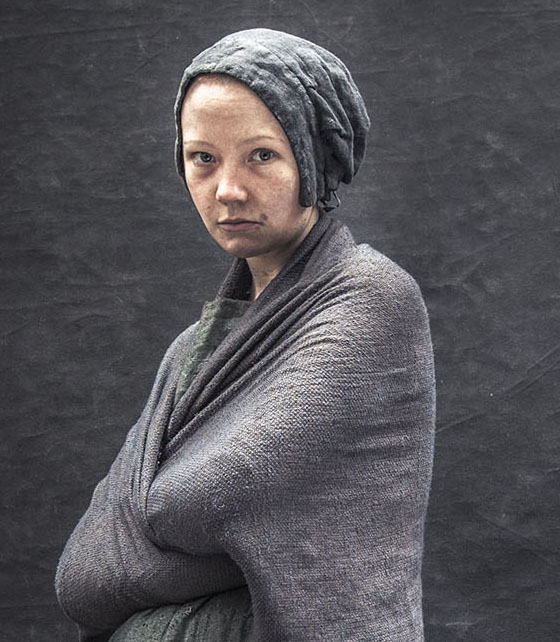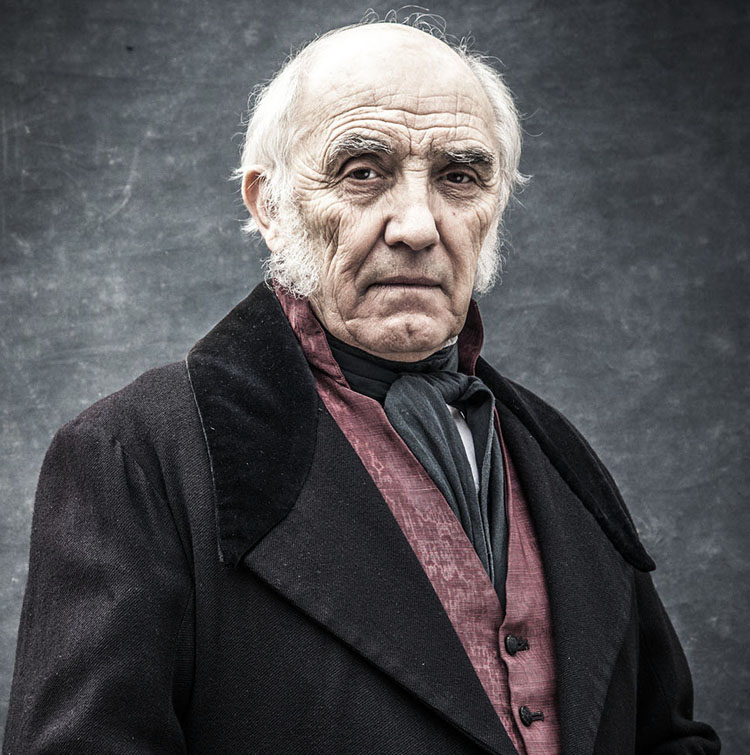The Mill, Channel 4 | reviews, news & interviews
The Mill, Channel 4
The Mill, Channel 4
Historically-based Industrial Revolution drama should have stuck to fiction

Does it always have to be so flipping grim up north? In Channel 4's new four-parter, the Mill in question is at Quarry Bank in Cheshire. The date: 1833, during the Industrial Revolution. Villains du jour: the Greg family, industrialists and merciless exploiters of child labour.
As the first episode opened with the tolling of the wake-up bell calling the poor, struggling young workers to another dismal day on the factory floor, it all felt terribly familar. We were back at Lowood school with Jane Eyre, enmeshed in the proles-versus-fatcats class struggle of South Riding, reliving the grinding working class horrors of life in The Village and even getting a flashback to Call the Midwife. We thrilled again to the battle between the wealthy Hardacres and the impoverished Fairchilds in Brass. Perhaps most of all, it was Mrs Gaskell's North and South revisited.
 Current commissioning editor thinking seems to be that if you haven't got a Downton Abbey, you need an anti-Downton Abbey, though heaven knows how this thing found its way to the top of the pile. John Fay gets the writer's credit, but I reckon there's an app for this, where you just keep scrolling down and tick the relevant boxes (select historical checkpoints, choose level of gratuitous cruelty and number of piteous photogenic children daubed with instant workhouse grime, decide where you want to introduce handsome, high-minded hero to rally the downtrodden workers etc). Pick several colourful regional accents, specify expensive china and appropriate gravel drive for the Big House, add an unpleasant industrial accident and a bullying sex-pest who keeps groping the girls, then hit "print" and you're done.
Current commissioning editor thinking seems to be that if you haven't got a Downton Abbey, you need an anti-Downton Abbey, though heaven knows how this thing found its way to the top of the pile. John Fay gets the writer's credit, but I reckon there's an app for this, where you just keep scrolling down and tick the relevant boxes (select historical checkpoints, choose level of gratuitous cruelty and number of piteous photogenic children daubed with instant workhouse grime, decide where you want to introduce handsome, high-minded hero to rally the downtrodden workers etc). Pick several colourful regional accents, specify expensive china and appropriate gravel drive for the Big House, add an unpleasant industrial accident and a bullying sex-pest who keeps groping the girls, then hit "print" and you're done.
The series is said to be rooted in real historical events, but the cliches clunked so loudly and every turn of the plot was so laboriously pre-semaphored that judging whether anybody's acting was better than anyone else's became almost impossible, and was in any case irrelevant. These people aren't characters, they're categories. You couldn't help noticing Kerrie Hayes as Esther Price (pictured above), who might as well have had a bright orange label reading "Feisty and Rebellious" sewn onto her factory smock. She bellowed at everyone in a foghorn Scouse accent and tried to rouse her fellow-workers against the brutish sexual predator and "overlooker", Charlie Crout (Craig Parkinson at his most knuckle-scrapingly repulsive).
 The rich-bastard Gregs are headed by the patriarch Samuel (Donald Sumpter, pictured left, channelling Lurch from The Addams Family with a transfusion of Dickensian gloom). His son Robert (Jamie Draven), although eager to keep wringing every last drop of blood, tears and sweat from the family's captive cadre of children, also wants more and better mechanisation ("I believe in the future - anything is possible"). Thus he has hired camera-friendly Daniel Bate (Matthew McNulty), who may be a pinko "agitator" but is also a gifted engineer. For some reason Bate hates John Doherty (Aidan McArdle), who is campaigning stridently for the "10 Hour Bill" which would limit the number of hours children are forced to work.
The rich-bastard Gregs are headed by the patriarch Samuel (Donald Sumpter, pictured left, channelling Lurch from The Addams Family with a transfusion of Dickensian gloom). His son Robert (Jamie Draven), although eager to keep wringing every last drop of blood, tears and sweat from the family's captive cadre of children, also wants more and better mechanisation ("I believe in the future - anything is possible"). Thus he has hired camera-friendly Daniel Bate (Matthew McNulty), who may be a pinko "agitator" but is also a gifted engineer. For some reason Bate hates John Doherty (Aidan McArdle), who is campaigning stridently for the "10 Hour Bill" which would limit the number of hours children are forced to work.
Plenty of historical stuff about working conditions and trade unionism to come in future episodes apparently. Which doesn't mean it will start to feel any more lifelike.
The future of Arts Journalism
You can stop theartsdesk.com closing!
We urgently need financing to survive. Our fundraising drive has thus far raised £49,000 but we need to reach £100,000 or we will be forced to close. Please contribute here: https://gofund.me/c3f6033d
And if you can forward this information to anyone who might assist, we’d be grateful.

Subscribe to theartsdesk.com
Thank you for continuing to read our work on theartsdesk.com. For unlimited access to every article in its entirety, including our archive of more than 15,000 pieces, we're asking for £5 per month or £40 per year. We feel it's a very good deal, and hope you do too.
To take a subscription now simply click here.
And if you're looking for that extra gift for a friend or family member, why not treat them to a theartsdesk.com gift subscription?
more TV
 Blu-ray: The Sweeney - Series One
Influential and entertaining 1970s police drama, handsomely restored
Blu-ray: The Sweeney - Series One
Influential and entertaining 1970s police drama, handsomely restored
 I Fought the Law, ITVX review - how an 800-year-old law was challenged and changed
Sheridan Smith's raw performance dominates ITV's new docudrama about injustice
I Fought the Law, ITVX review - how an 800-year-old law was challenged and changed
Sheridan Smith's raw performance dominates ITV's new docudrama about injustice
 The Paper, Sky Max review - a spinoff of the US Office worth waiting 20 years for
Perfectly judged recycling of the original's key elements, with a star turn at its heart
The Paper, Sky Max review - a spinoff of the US Office worth waiting 20 years for
Perfectly judged recycling of the original's key elements, with a star turn at its heart
 The Guest, BBC One review - be careful what you wish for
A terrific Eve Myles stars in addictive Welsh mystery
The Guest, BBC One review - be careful what you wish for
A terrific Eve Myles stars in addictive Welsh mystery
 theartsdesk Q&A: Suranne Jones on 'Hostage', power pants and politics
The star and producer talks about taking on the role of Prime Minister, wearing high heels and living in the public eye
theartsdesk Q&A: Suranne Jones on 'Hostage', power pants and politics
The star and producer talks about taking on the role of Prime Minister, wearing high heels and living in the public eye
 King & Conqueror, BBC One review - not many kicks in 1066
Turgid medieval drama leaves viewers in the dark
King & Conqueror, BBC One review - not many kicks in 1066
Turgid medieval drama leaves viewers in the dark
 Hostage, Netflix review - entente not-too-cordiale
Suranne Jones and Julie Delpy cross swords in confused political drama
Hostage, Netflix review - entente not-too-cordiale
Suranne Jones and Julie Delpy cross swords in confused political drama
 In Flight, Channel 4 review - drugs, thugs and Bulgarian gangsters
Katherine Kelly's flight attendant is battling a sea of troubles
In Flight, Channel 4 review - drugs, thugs and Bulgarian gangsters
Katherine Kelly's flight attendant is battling a sea of troubles
 Alien: Earth, Disney+ review - was this interstellar journey really necessary?
Noah Hawley's lavish sci-fi series brings Ridley Scott's monster back home
Alien: Earth, Disney+ review - was this interstellar journey really necessary?
Noah Hawley's lavish sci-fi series brings Ridley Scott's monster back home
 The Count of Monte Cristo, U&Drama review - silly telly for the silly season
Umpteenth incarnation of the Alexandre Dumas novel is no better than it should be
The Count of Monte Cristo, U&Drama review - silly telly for the silly season
Umpteenth incarnation of the Alexandre Dumas novel is no better than it should be
 The Narrow Road to the Deep North, BBC One review - love, death and hell on the Burma railway
Richard Flanagan's prize-winning novel becomes a gruelling TV series
The Narrow Road to the Deep North, BBC One review - love, death and hell on the Burma railway
Richard Flanagan's prize-winning novel becomes a gruelling TV series
 The Waterfront, Netflix review - fish, drugs and rock'n'roll
Kevin Williamson's Carolinas crime saga makes addictive viewing
The Waterfront, Netflix review - fish, drugs and rock'n'roll
Kevin Williamson's Carolinas crime saga makes addictive viewing

Add comment